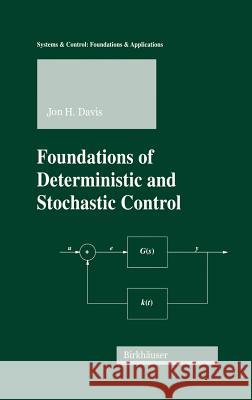Foundations of Deterministic and Stochastic Control » książka
Foundations of Deterministic and Stochastic Control
ISBN-13: 9780817642570 / Angielski / Twarda / 2002 / 426 str.
Control theory has applications to a number of areas in engineering and communication theory. This introductory text on the subject is fairly self-contained and aimed primarily at advanced mathematics and engineering students in various disciplines. The topics covered include realization problems, linear-quadratic optimal control, stability theory, stochastic modeling and recursive estimation algorithms in communications and control, and distributed system modeling. These topics have a wide range of applicability, and provide background for further study in the control and communications areas. In the early chapters the basics of linear control systems as well as the fundamentals of stochastic control are presented in a unique way so that the methods generalize to a useful class of distributed parameter and nonlinear system models. The control of distributed parameter systems (systems governed by PDEs) is based on the framework of linear quadratic Gaussian optimization problems. The approach here utilizes methods based on Wiener-Hopf integral equations. Additionally, the important notion of state space modeling of distributed systems is examined. Basic results due to Gohberg and Krein on convolution are given and many results are illustrated with some examples that carry throughout the text. The standard linear regulator problem is studied in both the continuous and discrete time cases, followed by a discussion of the (dual) filtering problems. Later chapters treat the stationary regulator and filtering problems with a Wiener-Hopf approach. This leads to spectral factorization problems and useful iterative algorithms that follow naturally from the methods employed. The interplay between time and frequency domain approaches is emphasized.











